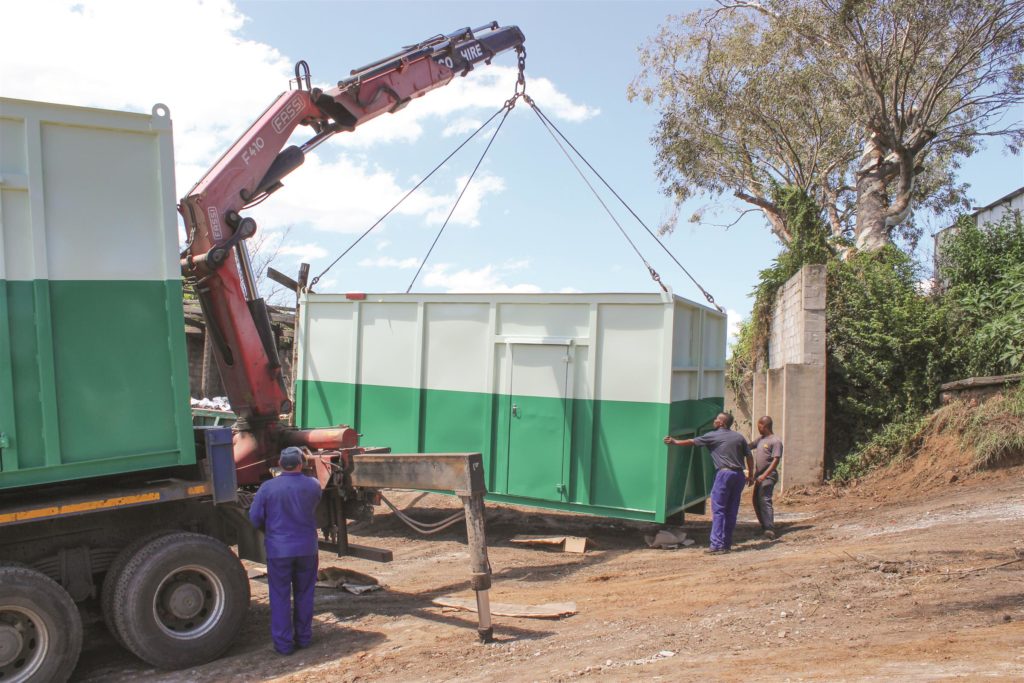
The Integrated Waste and Recycling Services (IWARS) portable units were delivered to an area adjacent to Makana’s Kop old age home in Joza, Sugarloaf Hill and the Carlisle Street dump.
IWARS employee Kevin Lee, who supervised the offloading, said the centres would be open from last Monday (22 February), 9am to 5pm.
Grocott’s Mail spoke to project manager Mark Price on operational day 2.
What are the buy-back centres and how do they work?
The centres are custom-made metal units built by a factory in King Wiliiam’s Town. They have the same dimensions as shipping containers, so they can be handled with standard equipment. Only their height is different.
The unit has solar-powered lights. It has an office area with a toilet and basin and a suppliers’ area where material is weighed. These, as well as the system hosting the IT for recording suppliers and sales is built to be vandal- and theft-proof.
Sales of recycling material are currently being recorded by hand, but in two months special software should be in operation that will record names, ID, the quantities bought, fingerprints and a photo of suppliers.
This data – as well as the scales – are put into the programme which generates a payslip and feeds into stats via a 3G connection.
The material is tracked all the way from the scales at the buy-back centre, to the truck that transports it, to the processors.
Why are IDs necessary?
This project is a partnership funded by the Employment Creation Fund.
What that means is we are obliged to prove what work it is creating and for whom, and what impact it is having in different sectors. It’s very easy to do this when there is proper recording and proper auditing.
The buy-back units are like tentacles, bringing work and income to people via the processing unit. It’s a model for creating sustainable jobs, and so fits into local economic development.
That, in turn, has spin-offs for education (we are involved in the EcoSchool initiative), the environment and health.
How does the partnership aspect work, and how much is it worth?
IWARS has to obtain a letter of support from every municpality it works with, to go with the business plan it submits to the Department of Trade and Industry’s Employment Creation Fund. We have a contract with the DTI and a memorandum of understanding with Makana and other municipalities.
The value of the contract is R20 million.
We have spent R5m on the base work for developing the IT systems, and setting up and implementing the systems in Ndlambe. That came in the first tranche.
The second tranche, R4.2m, will be used to finish off the Bushmans River operation, develop the operation at Makana and start work at Blue Crane.
In Makana we are establishing three buy-back centres – one in Grahamstown, one in Riebeeck East and one in Alicedale.
We also intend to get the local processing unit up and running. We are watching progress at the landfill site, to see if security is improved there. If not, we have a Plan B to have it running on a site that’s safe.
In Makana, we will also be bringing in IT systems and another vehicle, and will spend some of the budget on awareness campaigns and advertising. Here we may also consider additional centres in the Makana area.
What will your relationship be with existing recycling operations, and how does your business model differ?
We have informed the bigger operators and are open to agreements with others.
What differentiates IWARS is that we accept both high-value and low-value material. Because we handle high volumes, this is sustainable and profitable. The smaller operations can’t sign contracts with the big processing companies because they can’t supply the minimum quantity.
IWARS is an implementing agent – we are project managers. With success, we can secure more funds and set up more projects.
IWARS has a 31% shareholding in the business – the rest is in the form of equity to the recyclers i.e. the PTYs representing the municipal areas.
What is the timeline for setting up your operations?
Everything has to be implemented in all our areas of operation by 31 December.
VIDEO
Take a tour of the Carlisle Street Unit here: bit.ly/GrocEnviro3
OTHER RECYCLING OPERATIONS IN GRAHAMSTOWN
* Grahamstown Recycling: 13 Scholand Street (industrial area), Chris Smith: 082 657 4719 chris.recycle@gmail.com
Complete Compost: info@completecompost.co.za
Jeanine Rado 074 897 2942
Eco Bin Solutions: Become a member and have all your recyclable and compostable waste collected and properly dealt with. More info: info@ecobinsolutions.co.za / sales@ecobinsolutions.co.za or call St John Ritchie on 083 535 6248 / William Milne on 083 303 0203 / Leslie Ginn on 082 652 4158.
Masahlule Recycling Business: At Grahamstown landfill site. More info: Simpiwe on simpiwemngcongo(at)yahoo.com, 076 582 1541 and Mark on mark.price(at)iwars.co.za, 081 792 3884
Metal Master: 2 Cloncore St (near Metro Cash & Carry), Grahamstown. Open 7.30am-6pm. More info: Butch Richardson / Len Bodill, 082 932 6844 / 046 622 3249 / butch@albanynet.co.za or wanstonfield@yahoo.com
GHT movers: 20 New Street. More info: Pieter Burger 083 226 9654 or Deon Meintjies 078 112 3462


